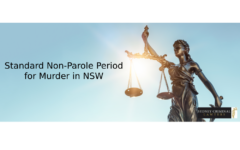What is the Standard Non-Parole Period for Murder in New South Wales?

Former New South Wales police officer Beau Lamarre-Condon appeared via audio visual link in Downing Centre Local Court yesterday charged with murdering Jesse Baird and his boyfriend, Luke Davies, inside a home in Sydney on 19 February 2024.
The 29-year old has been facing five charges; two charges of murder and one count of break, enter and assault with intent to murder as well as two charges of murder (domestic violence related), the latter being brought last month.
In a move that has confused some segments of the mainstream media, the two murder charges were formally withdrawn in court.
But to those in the legal profession the move is a clear sign the Office of the Director of Public Prosecutions is intent on pursuing the most serious charges, which are murder charges aggravated by occurring in the context of a domestic relations.
And to further explain the move, it might be noted that in cases where the prosecution is able to prove murder but not that the act was domestic violence-related, the jury may nevertheless return a guilty verdict to murder.
The allegations
Mr Lamarre-Condon stands accused of murdering 26-year old Mr Baird, a Channel 10 presenter, as well as Baird’s partner, 29 year old Mr Davies, inside their home in Paddington in Sydney’s inner-suburbs.
The bodies of the pair were found concealed in wrapped surfboard bags at Bungonia, around 200 kilometres south-west of Sydney.
The prosecution alleges that Mr Condon had displayed predatory behaviour in the past, stalking and harassing his former partner Mr Baird for several months in the lead-up to the alleged murders.
What is a Non-Parole Period?
A non-parole period is the minimum period of time an inmate must remain in prison before being eligible to apply for release on parole.
This non-parole period will be followed by a period on parole – which is time spent in the community under a range of conditions.
What is a Standard Non-Parole Period?
A standard non-parole parole period (or SNPP) is a guidepost or reference point for a sentencing judge when determining the duration of a person’s non-parole period.
SNPPs do not apply to all criminal offences, but to many which are considered particularly heinous and/or prevalent.
They are meant to promote consistency in the sentencing of offenders as well as to ensure the community is protected for an appropriate period of time and deter those who might consider committing such crimes.
What is the Maximum Penalty for Murder in New South Wales?
The maximum penalty for all murder offences in New South Wales is life in prison, meaning for the term of a person’s natural life.
What Are the Standard Non-Parole Periods for Murder Offences in New South Wales?
The SNPP for an offence of murder in New South Wales is generally 20 years in prison.
However, the SNP increases to 25 years in prison where the victim was a police officer, emergency services worker, correctional officer, judicial officer, council law enforcement officer, health worker, teacher, community worker, or other public official, exercising public or community functions and the offence arose because of the victim’s occupation or voluntary work.
The SNPP is also 25 years where the victim was under the age of 18 years.
And although none of these categories apply to Mr Lamarre-Condon’s alleged offences, a finding of guilt of murder that falls within the definition of a domestic relationship – which includes as a partner, former partner or family member – is a matter that can aggravate and thereby increase the penalty that is ultimately imposed.






